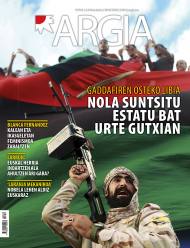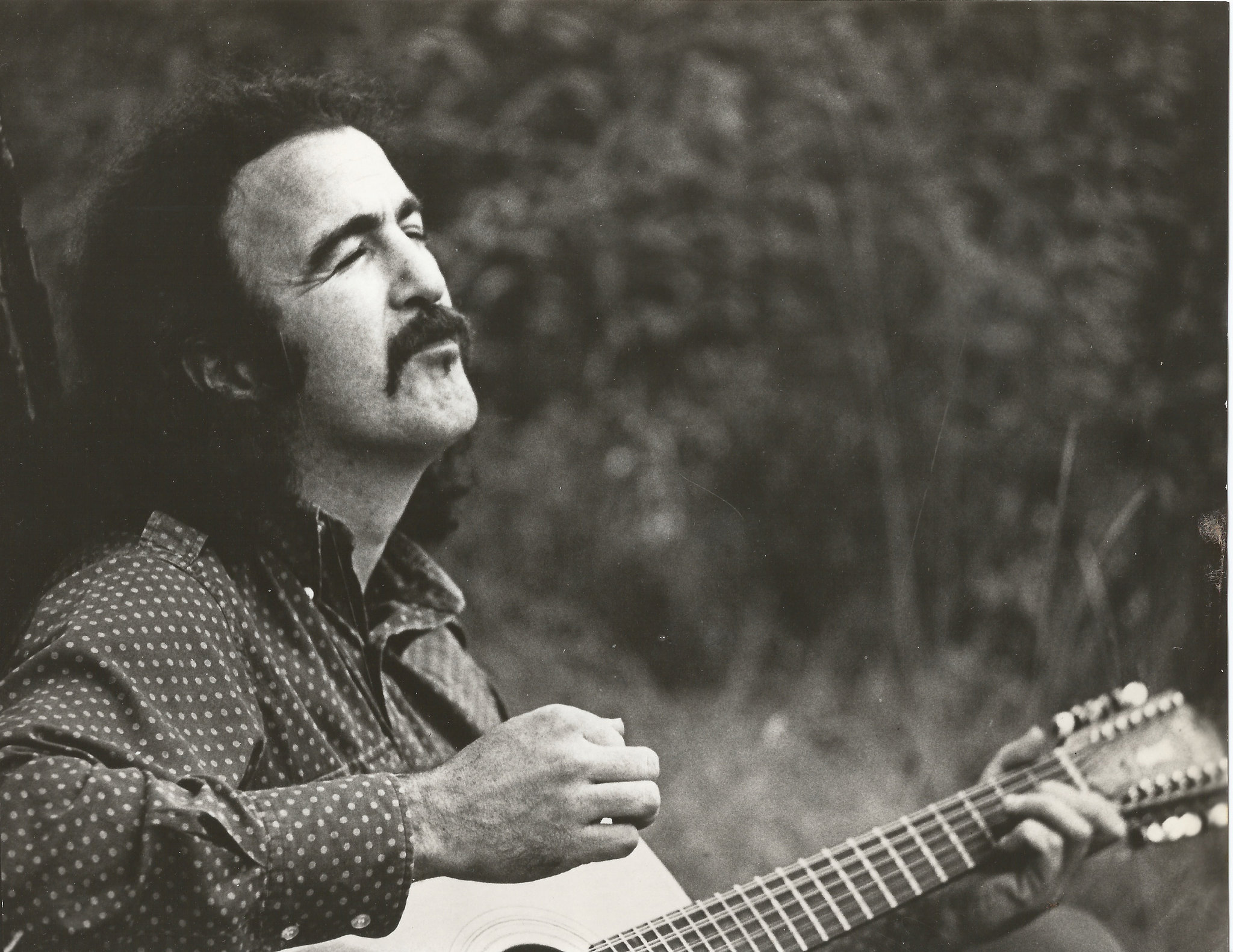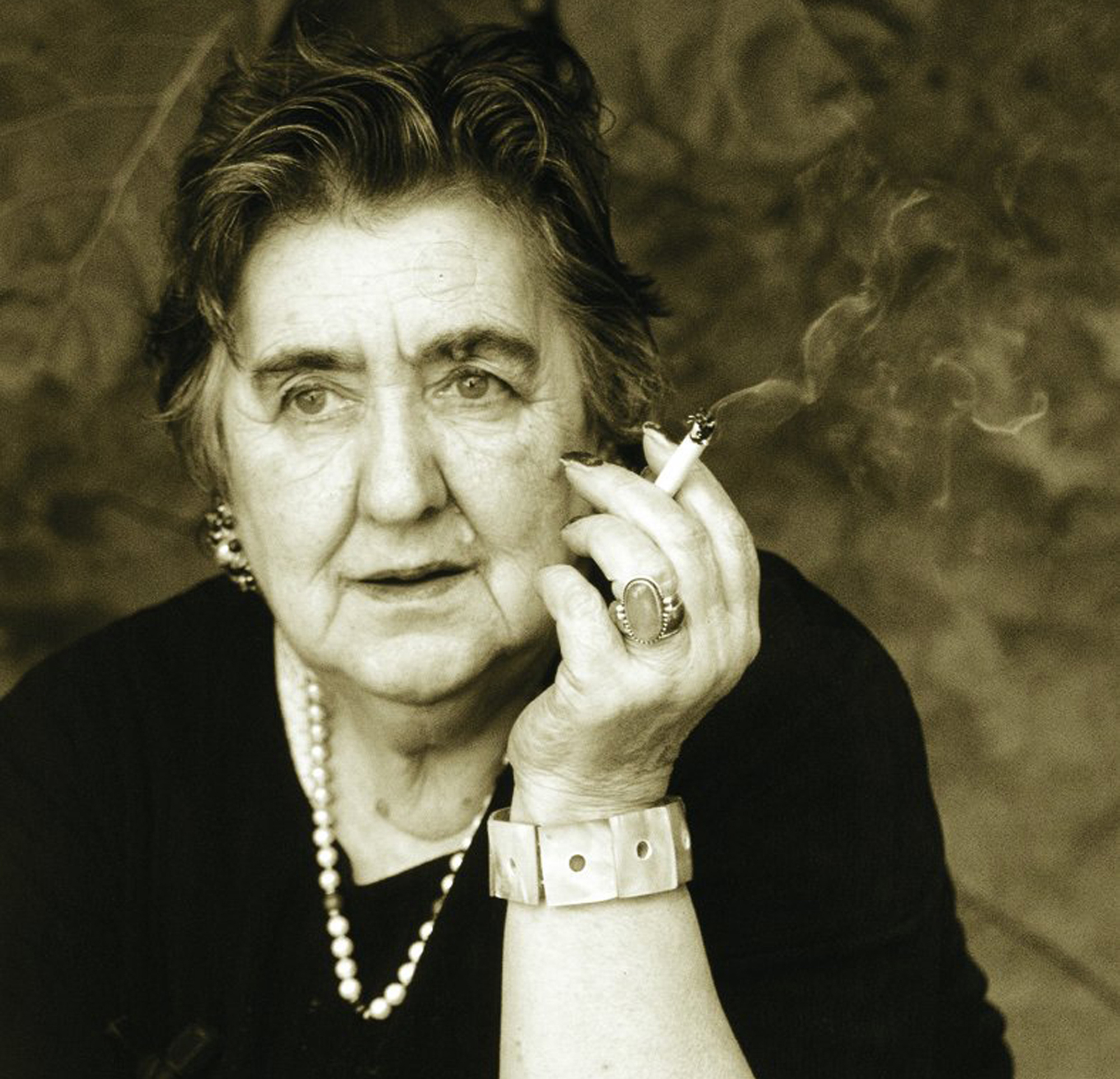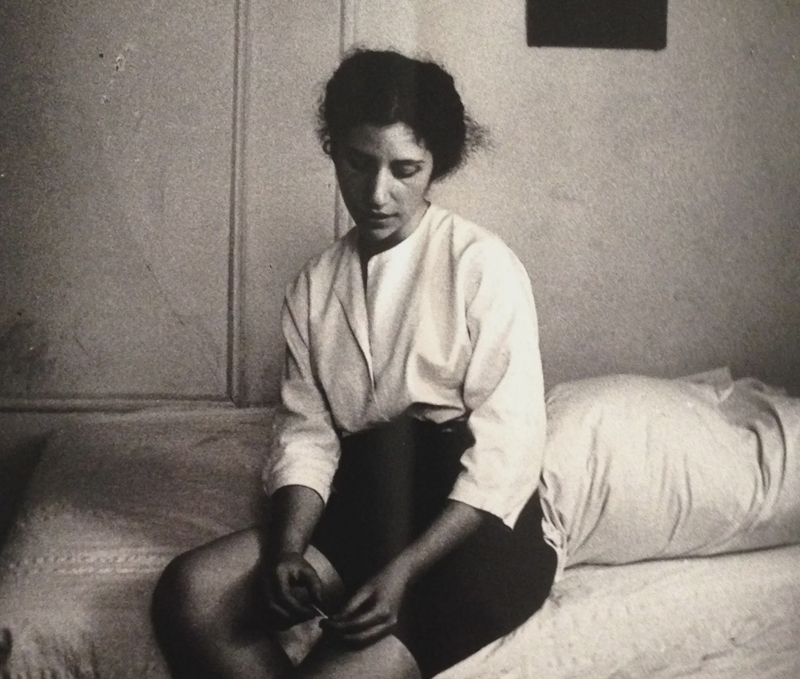History of a misinterpreted novel
- The editorial Meettok will soon publish the novel in the Basque Country A Clockwork Orange (1962) by the writer Anthony Burgess.Ion Olano Carlos has translated the classic of the 20th century and, by the way, has given us many keys to understanding the book. Stanley Kubrick's film has made the essence of a little-known story not very well understood. Will it help to delve into the debates that this publication raises at least among us?

Prior to the start of the tape recorder, the translator Ion Olano Carlos has brought some materials to the table on the terrace where we are performing the interview. Inventarium mechanical orange: Five editions of A Clockwork Orange – original in English; and The Orange Mechanics, L’Orange mécanique, Arancia meccanica and La taronja mecànica, translations in Spanish, French, Italian and Catalan –; the DVD of the film from the novel by Stanley Kubrick, in which the translator reproduces a poster with themes in Basque. With this luggage that he has taught us outside the Kaxilda library of Donostia, Olano has made a translation journey that has lasted more than ten years and will be presented soon. The best-known book by writer Anthony Burgess, finally, is available in Basque.
Olano soon read a Spanish-language edition, and by 2007, he began translating it. “I translated the dictionary first, it seemed to me that the nadsat is the basis of the book,” he explained. It is a jargon created specifically by Burgess for her characters, which has a Slavic tone, especially Russian, and elements of the Gypsy language, mixed with English. A fundamental complication in translating the novel: the need to translate a language that does not exist. “Headwashing is one of the most powerful themes of Mechanical Orange and the book does it from the very beginning: if you want to advance in history, you have no choice but to get used to it.”
Stanley Kubrick did not introduce the last chapter of the book in her adaptation to film, which distorted the message Burgess wanted to convey.
The first version he had in his hands was made by a Mexican, and Olano believes that this Spanish translation is very good, it works, but when he compared it with that of English he did not find it entirely accurate, he needed more references. “Due to lack of trust and experience, I also returned to the versions of other languages I knew: Catalan, Italian and French.” The look returns to the books on the table: he begins to become aware of the level of detail of the work done, while the translator explains the differences between them: “The Italian version seems to me to be the freest, makes guesses of Christ especially from the dictionary, but it works well in the Italian context.” The French is, however, the most balanced: with the original text you can read with pleasure the faithful and Galician readers. That's the hardest thing. “How to achieve this aesthetic impact, which also appears in the images of the film, but which Burgess achieved with the words; how to achieve it in Basque.”
You have to create a style, make a creative translation. The beginning was hard, it fought for a long time against the first chapter. And then the circumstances: “I’m not a translator, and this has not been funded by anyone. Now the publisher Meettok has been interested in publishing it, but throughout the time it has been one thing I saw, although I had no means to do it.” It has been spinning around, therefore: When he studied in Barcelona, he went ahead a lot, but he got stuck, he put it aside, to take it back. A journey of more than ten years, always with the certainty that the book would work in Basque. “I wasn’t so sure that I was the person who had the ability to translate this to Euskera.” For this reason, he thanked the translators who advised him: The contributions of Nagore Tolosa, Garazi Arrula and Danele Sarriugarte at the different moments of the process have been challenging for Olano, who has described them as indispensable.
Apology for violence?
In addition to being a book that saves a thousand demons for those who start translating, Mechanical Orange is one of those icons of work, a cult work, a novel that has been able to create an imaginary of its own, but that has been somewhat disfigured by Stanley Kubrick's film in 1971. That's what we've talked to Olano, taking advantage of the fact that there's also a DVD of the movie on the table. “The most obvious difference between the two is the last part,” he explains. “The book consists of 21 chapters and there is a reason for this: At 21 you get the age of majority in England and EE.UU. [note: the spoiler matches in the following sentence]. In this last section, the protagonist Alex decides for himself to abandon this road full of violence”.
Ion Olano Carlos:
“I find it curious how the aesthetic of the film is widespread, but there is no reflection”
The translator believes that Kubrick’s intention was not to apologize for ultraprecision, but to spread a critical message with violence. “But since he did not include this last part in the film, the result was rather cynical. For without that, it seems that evil will always be evil, that whoever practices violence will always practice, that there is no possible change.” The message was quite the opposite: Burgess wanted to state that the human being has the ability to decide, that he can choose between good and evil, which is what makes human and not… a mechanical orange, that is, something that, although apparently alive, is managed by some mechanisms – hence the title and in the novel is well understood, as Olano says, but in the film no.
Violence is one of the main themes of the book, “and it poses it very seriously, because it asks you to make a moral choice: What do you feel about this?” It will be clear that the protagonist does not feel anything wrong with being violent, but what will it do to the inner professor to live the story with him? “Alex is a narrator, aggressor, and Burgess forces the reader to be complicit in this violence from the very beginning. You follow the march of this aggressor and if you keep reading, you have to pass these actions through your body.”
Beatings, rapes and extreme violence are not the accounts of 56 years ago when the book was published and, in relation to Mechanical Orange, terrible paradoxes also appear at this time. One of those involved in the group rape of the Sanfermines of Pamplona in 2016 had the characters of the Kubrick film tattooed: An example of how what Burgess wanted to express was misunderstood. “I find it curious how the aesthetic of the film is very widespread between groups on the left and right; music groups, football fans… but there is no reflection. When a lot of people wear the Mechanical Orange T-Shirt, I don’t know what it really means,” Olano explains. “I think they want to express a kind of force… But what they do in the book and in the film are collective attacks, often against people who cannot defend.”
Rape of Lynne Isherwood
Anthony Burgess’s wife, Lynne Burgess – before getting married, Lynne Isherwood – was the victim of a collective attack of this kind. In 1940, she was raped in London by four deserters of the U.S. army. She was pregnant and, according to all indications, had lost her child because of this aggression, as well as being traumatized for life.
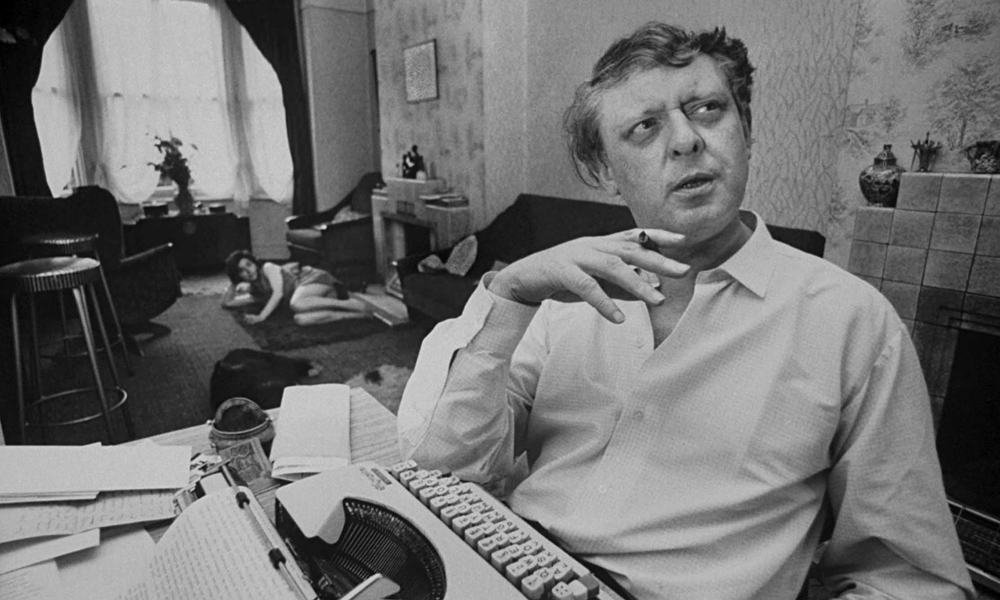
Nineteen years later, doctors told Burgess that he had a head tumor and gave him a year of life expectancy. In anticipation of the bad state of his wife's death, he began to compulsively write to bequeath to his partner the copyright money: five novels in a year. One of them was Mechanical Orange, in which the writer and Isherwood are indirectly reflected: in a passage of the novel, Alex and other drugs enter the house of a couple and rape their wife. The husband is a writer, and the novel he's writing at the time is called Mechanical Orange.
“I think he used that violent episode to make a kind of catharsis,” says Olano. “It was an attempt to atonement for sin [Burgess was a Catholic, had studied in a college of Jesuits], not only of these aggressors, but their sins. And for that he got into the book, he got personally involved, he didn’t get out of the story,” he explained. “He confessed that he enjoyed writing, raping and beating such beatings, without being present. He recognized that he knew those sins and I find that very interesting because he does not escape those issues. She knows what that evil is, because she is also, in part, bad.”
This 20th century classic looking for redemption, thinking that his life was at the doorstep of death, with the burden of trauma that had survived for years. But life had other plans for Burgess. The diagnosis he was given was wrong, he did not die. His wife did, 1968. And Mechanical Orange chased her all her life, because in her prolific career, with more than 50 books edited, it is the work that distinguishes her most, but under the shadow of Kubrick's film, with all the misunderstandings that caused her.
This translation in Basque offers the possibility of returning to the original spirit of the book. The edition that will be published with the help of the editorial Meettok will also be special: it will have the notes of the English edition of the 50th anniversary of the novel, as well as others that Olano has added and that may be of interest to the Basque reader. “My intention was to create an artifact. We had to seize the opportunity, because it is a very juicy work,” the interview has finished.
Eleberri distopikoa izanda, bere garaiko tendentziak baliatu zituen Burgessek Laranja mekanikoa-n etorkizuneko proiekzioak egiteko eta ukitu zituen gai batzuekin itu-ituan jo zuela dirudi.
Gazte biolentoen banda bat da nobelaren ardatza, 1960ko hamarkadan agertzen hasiak ziren gang-etatik gaur egun arte asko ugaritu den fenomenoa mundu aberatseko hirietan. “Gazteek egin dezaketen indarkeria itxuraz zentzugabea –gazteek sentitzen duten frustrazioari lotua–, estatuak egiten duen biolentzia legezkoa –poliziaren, kartzelaren eta zientziaren aplikazio konkretu baten bitartez–… Gaur egun bizi dugun egoera ere horrelakoa da, eta horren aurrean pizten den eztabaidak bizirik jarraitzen du”, Olanoren ustez.
Beste hainbeste esan daiteke drogek liburuan duten tokiaz. “Moloko izeneko substantzia hartzen dute protagonistek ekintza biolentoak egin aurretik. Hori da beste gai garrantzitsu bat: drogen erabilera, zergatik kontsumitzen ditugun, zer dagoen atzean. Ez irakurketa moralista egiteko, ‘drogak ondo daude’ edo ‘gaizki daude’ esateko, hor daudela esateko baizik, indarkeria dagoen bezala”.
Alex eta bere lagun ultrabiolentoen gustu musikal finak ere, irakurlea jartzen du bizirik dirauen eztabaida baten aurrean: goi-mailako kulturak pertsona hobe bihurtzen zaitu? “Gure alde xaloak ikusten du kontraesan bat horretan. ‘Nola liteke Beethoven zale batek pertsona bat jipoitzea?’. Baina ez dauka zerikusirik. Historiak erakusten digu ezetz, badakigu ofizial nazi askoren afizio kulturalak zein finak ziren”, dio Olanok. Berdin Laranja mekanikoa-ren protagonistentzat: Ludwig Van-en musika entzuten eta piztia krudelen moduan jokatzen.
Ereserkiek, kanta-modalitate zehatz, eder eta arriskutsu horiek, komunitate bati zuzentzea izan ohi dute helburu. “Ene aberri eta sasoiko lagunok”, hasten da Sarrionandiaren poema ezaguna. Ereserki bat da, jakina: horra nori zuzentzen zaion tonu solemnean, handitxo... [+]
Adolfo Bioy Casares (1914-1999) idazle argentinarrak 1940an idatzitako La invención de Morel (Morelen asmakizuna) eleberria mugarritzat jotzen da gaztelaniaz idatzitako literatura fantastikoaren esparruan. Nobela motza bezain sakona da, aparta bere bakantasunean, batez... [+]
Ekain honetan hamar urte bete ditu Pasazaite argitaletxeak. Nazioarteko literatura euskarara ekartzen espezializatu den proiektuak urteurren hori baliatu du ateak itxiko dituela iragartzeko.
Aste honetan aurkeztu da Joseph Brodskyk idatzitako Ur marka. Veneziari buruzko saiakera. Rikardo Arregi Diaz de Herediak itzuli eta Katakrak argitaletxeak publikatu du poeta errusiar atzerriratuari euskarara itzuli zaion lehen liburua.
"There were women, there they were, I met them, but their families locked them in the mental hospital, put them in electroshock. In the 1950s, if you were a man, you could be a rebel, but if you were a woman, your family would lock you in. There were some cases, and I met them... [+]
Gauza garrantzitsua gertatu da astelehen honetan literatura euskaraz irakurtzea atsegin dutenentzat: W. G. Sebalden Austerlitz argitaratu du Igela argitaletxeak. Idoia Santamariak egindako itzulpenari esker, idazle alemaniarraren obrarik ezagunena nobedadeen artean aurkituko du... [+]









